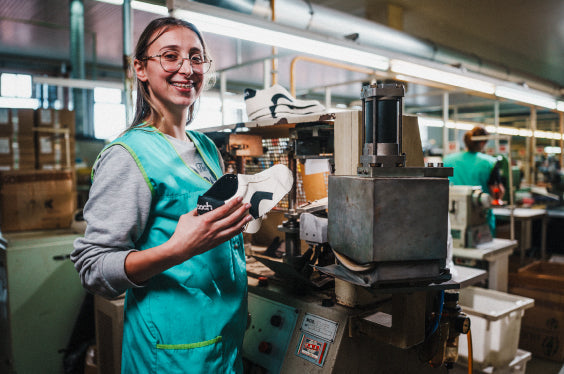Your Noochies will be born in Portugal. Here's why that matters:
THE FOOTWEAR INDUSTRY'S DIRTY SECRET.
Let's face it: the conventional footwear industry has a pretty nasty track record when it comes to ethics and sustainability. Most major brands outsource production to countries like Vietnam, China, and Bangladesh, where labor is cheap, and environmental regulations are weak or nonexistent. The result? Exploitation of workers, massive pollution, and shoes that end up in landfills for centuries.
The human cost is stark - tragedies like the 2013 Rana Plaza factory collapse in Bangladesh, which killed over 1,100 workers, expose the dangers of fast fashion's race to the bottom. In Cambodia, mass faintings are common in sweatshop-like garment factories, where workers (often young women) are pushed to physical exhaustion in unsafe conditions. These incidents reveal the harsh realities behind cheap, disposable fashion and footwear.
PROTECTED BY EU LABOR LAWS.
In contrast, Portugal enforces strict EU labor laws. Workers benefit from:
- Fair wages that people can actually live on
- Safe working conditions, ensuring no tragic factory collapses or fires
- Reasonable working hours, preventing the 65+ hour weeks common elsewhere
- Absolutely no child labor
When you wear Nooch, you know that no one suffered to make your shoes.
CLEANER & GREENER.
Portuguese factories have to follow strict EU environmental rules on:
- Pollution control: Factories are required to minimize air and water pollution
- Waste management: Disposal and recycling processes are tightly regulated
- Chemical usage: Factories must adhere to the EU's REACH regulation (Registration, Evaluation, Authorization, and Restriction of Chemicals), one of the world's strictest chemical control laws
This means cleaner air, water, and soil – not just in Portugal, but globally. It's a stark contrast to countries where factories can dump toxic waste with little consequence.
PORTUGAL IS PUSHING SUSTAINABILITY FORWARD.
Portugal is serious about sustainability. The country exports over 76 million pairs of shoes annually, and the industry employs about 40,000 people. By 2030, the Portuguese footwear industry is set to invest €600 million into sustainable innovation. Key initiatives include:
- BioShoes4All Project: An €80 million initiative focusing on biomaterials and circular economy practices
- FAIST Project: A €50 million investment to develop "intelligent factories" with automated, sustainable production
- Green Pact: In 2023, 150 Portuguese footwear companies committed to sustainable design and improving energy efficiency
CUTTING DOWN THE CARBON FOOTPRINT.
Some of our materials are sourced from Asia but thanks to our community-activated model, we can ship them via boat instead of air freight. This drastically reduces emissions. For comparison:
- Maritime shipping emits 10-15 grams of CO2 per ton-kilometer, whereas air freight emits 500-950 grams
- Shipping by sea cuts transportation emissions by nearly 98% per ton-kilometer compared to air freight
- Additionally, producing in Portugal instead of China prevents CO2 emissions equivalent to what an average tree absorbs over seven years—for every ton of shoes shipped
Being closer to production means Nooch can:
- Visit factories regularly
- Communicate directly with workers
- Solve problems quickly
This hands-on approach ensures transparency and accountability that would be impossible with distant, outsourced production.
This is about more than just shoes—it's about playing a role in a global movement toward ethical and environmentally responsible clothing and apparel.
OUR PORTUGUESE PARTNERS.
We have teamed up with some amazing local partners that are all pushing the sustainable agenda forward:
- Selco Footwear: A family-run sourcing company specializing in sustainable materials and ethical production. Fun fact: Our key contact, Bernardo, is vegan—just like Nooch founders Stefan and Lotte. He's likely the only vegan footwear developer in Portugal!
- Eurovilde: A company with over 40 years of experience making high-quality footwear. Eurovilde is at the forefront of eco-friendly production, focusing on reducing waste, using renewable energy, and sourcing sustainable materials.
- Forever: A sole manufacturer since 1973, leading the way in sustainability. They use solar power, practice water conservation, and run a reverse logistics system, reusing 67% of their waste.
THE BIG PICTURE.
By choosing to produce in Portugal, Nooch is making a statement:
- People and the planet come before profits.
- Fair treatment of workers throughout the supply chain is non-negotiable.
- Reducing environmental impact at every stage is a top priority.
Yes, this decision might mean Nooch shoes cost a bit more. But it ensures that every pair represents a step towards a more ethical, sustainable future in fashion. When you choose Nooch, you're showing the fashion industry that you care about how products are made, not just how they look or how cheap they are.


